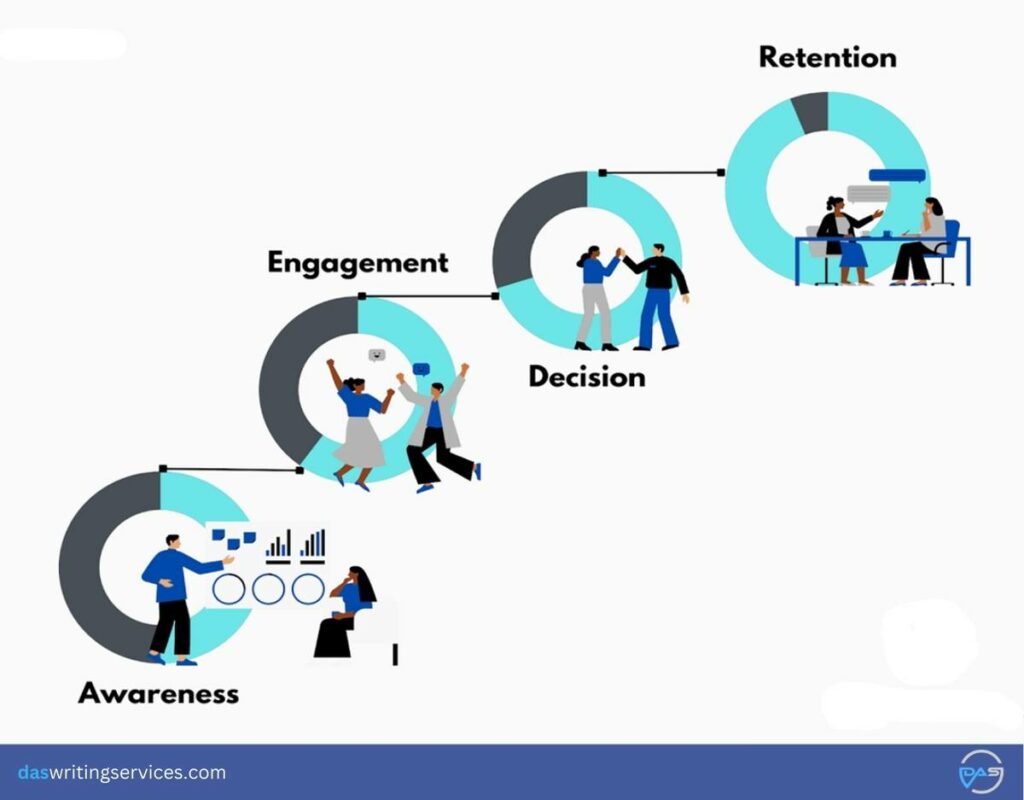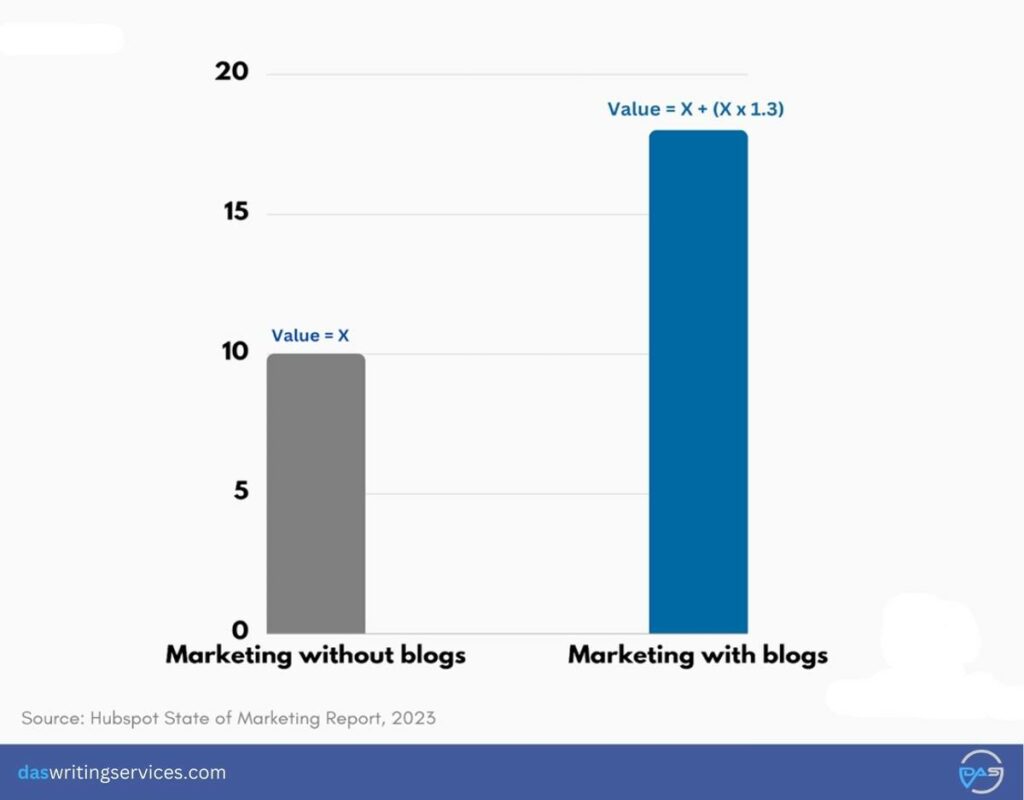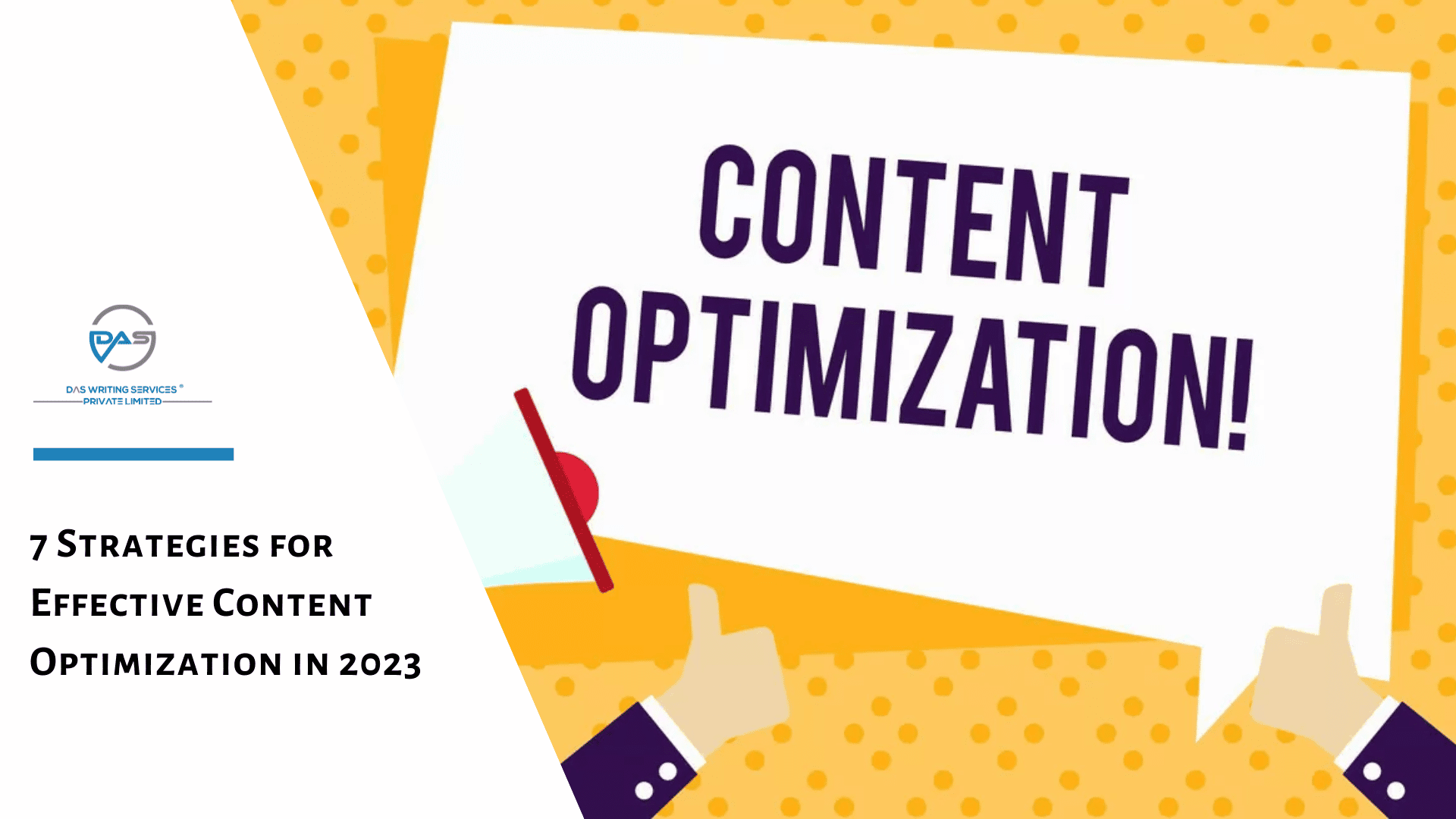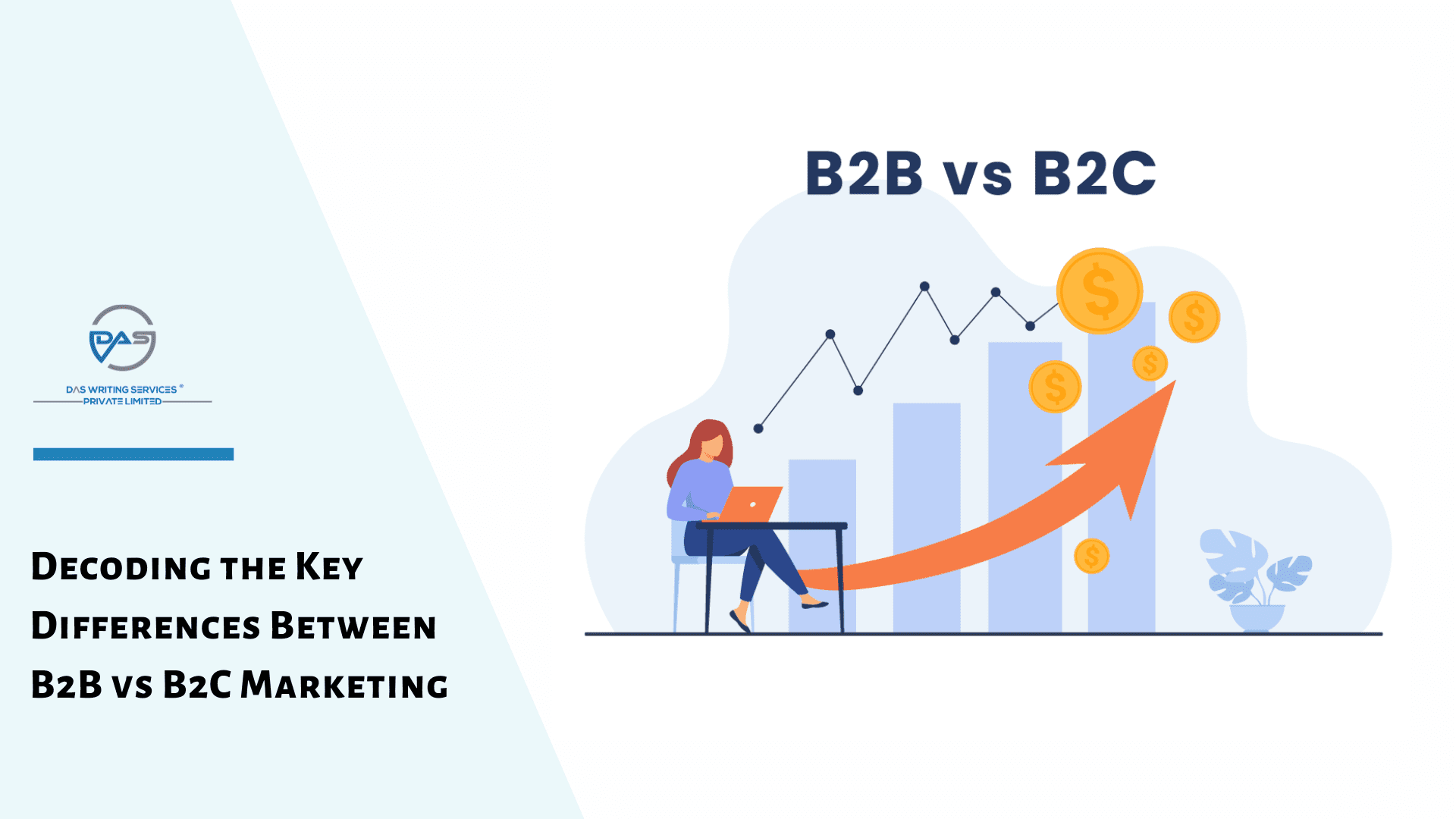Bill Gates’ famous slogan “Content is King” has pretty much shaped the trends of digital marketing in today’s world. A bit too much, to be honest! Many businesses have resorted to publishing rampant content without caring for any definite goals of content marketing.
The results? Thousands of pages, while a few of them rank, most do not live long on the SERP to draw relevant traffic.
Having a robust strategy is essential for sustainable business promotions. An aimless approach to content marketing is only as good as not having one. Using goal-oriented content can not only get you traffic but also help you gain valuable leads that allow powerful conversions.
When curating a content strategy, the flow of information is directed to ensure the following effects.

What are the General Goals of Content Marketing?
The world of content revolves around the word value. That is to say, whatever you communicate in your content must add something of importance to the target audience.
The following should be the primary goals or objectives for why you would want to use the content as the marketing tool for your business.
1. Share your Vision
Nowadays doing business is simply not enough. With so many players and competitors in the market, keeping your business a class apart is essential.
To enable that, clients should be able to identify with your vision which, in fact, promotes identification with your brand. So, do not cower away from sharing your dream and vision – it gives your content a much-needed personal touch.
2. Foster a Bond with Customers
The benefits of using content for digital marketing are multiple. However, it is differentiated from others because of its ability to connect with the customers. Content, when it reaches the right audience, can do wonders for your business.
Many reputed organisations recognise this necessity and use our newsletter service.
With a unique tonality and engaging content, your customers are able to identify with the character of your brand. It helps you foster a sustained relationship with your audience to generate effective results.

3. Increase Domain Authority
Correctly optimised content will not only develop your brand image to the public eye but also pull you into the limelight.
Having a decent domain authority indicates how much your website domain is valued by search engines. You can use popular domain checker tools like Moz, or Ahrefs to take a quick look at where your website is standing.
They help you get better ranks easily; they also help to establish yourself as a reliable figure in your field.
4. Build your Credibility
One of the key goals for content marketing is to establish you as a reliable player in the market. When posting regularly, a series of blogs and long-form content showcase your expertise in your field.
When there are multiple options in the market, consumers tend to choose their preference based on reputation. That is where a credible voice comes into the picture. Since content is a good medium to engage with the audience, blogs and articles are more likely to convert than traditional advertisements.
5. Identify Target Audience
Your business might have an existing demographic that you intend to target with your product and services. To ensure that your business is reachable to the correct demography, content is an efficient tool.
Based on user engagement, you can determine if you are able to crack the sweet spots of marketing. A common practice is to ask for feedback from your readers. Based on the inputs, you get a list of potential clientele along with valuable user feedback. There is no better win-win situation than this.
6. Build Up your Product
Before you actually launch the products, it is always a good idea to build hype around them. Your content marketing strategy can help you achieve that with attractive website copywriting hinting at the product.
Using a catchy marketing strategy, you can plan short-form content that anticipates products, offerings and upcoming services in your domain of business.
How to Set Achievable Content Marketing Goals for Your Business?
Common Mistakes that businesses make while determining their content plan is to set too vague of a target. Like saying we want more traffic.
How much more traffic are we talking about? Do we want to get traffic for the sake of it or generate leads? Defining such objectives clearly helps you strategise better for content marketing.
1. Define your Purpose
First and foremost, clearly define what you would like to achieve with your content. Is it just about traffic or you want to increase sales. If sales is your concern, then you will have to define how much sales are targeting. How soon do you want the results?
Based on the answers, the strategy of your content marketing goals are defined. For example, if your primary concern is to drive traffic, then you would want to target informational search intent specific keywords with significant search volume.
On the other hand, to get more conversions and enquiries, transactional and commercial keywords are suitable. This is why, clearly defining the purpose of your content marketing helps you optimize your marketing strategy for the desired outcome.
2. Audit your Present Situation
Before declaring an idealistic target, it is always wise to take a stock of our own situation in the market. Aiming for the stars is good, but we must still be realistic when it comes to setting content marketing goals.
Perform a thorough audit of your existing content, number of keywords ranking, organic website traffic, link network, and number of backlinks. It gives an idea as to what is your present situation in the market with respect to the competitors.
We hate to be the bearer of bad news but you simply cannot expect to instantly outrank a competitor. Especially when they have twice the DA and significantly more number of top ranking keywords than you.
Like every good thing, the success factor of your content marketing goals takes time. It depends on how realistic and achievable your plans are. Start small with low difficulty keywords and as you grow – then you can think about outranking the giants in the industry.
3. Break down your Roadmap into Monthly Content Plans
Larger milestones can be a bit overwhelming at times. Further, it is easier to lose track of tasks when you are targeting broad objectives such as 3.5x increase in conversions. It also causes poor executions.
So, break down your objective into individual plans for each month. Decide the number of keywords you would want to target and set out to create the content plan for the same.
Implement a blend of off-page and on-page SEO optimized content that increase your number of pages as well as increase the number of referring domains. It helps you increase your website traffic organically and most importantly sustainably.
4. Allocate Optimum Resources
On the way to realise your content marketing goals, the last thing you want is to waste time or resources. Both are vital for the growth of a company and lack of planning can drive up your costs while producing subpar results.
Based on the number of content you want to publish in a month, deploy SEO personnel, and content writers to your project. Get a project manager to streamline communication within the team as well to the stakeholders.
Or you may choose to outsource your content marketing campaign to us and get impressionable SEO optimized content that drives up your website traffic. Contact us for your free sample today.
5. Evaluate KPIs
Finally, the last step to realise your marketing goals is to keep track of your content marketing KPIs or Key Performance Indicators. You can use SEO tools to check the growth of your traffic, number of backlinks and link network. Keep reading to learn about the best SEO tools to evaluate your marketing performance metrics.
For example, if you want to get more organic traffic to your website, you must keep track of the number of organic clicks you are getting. Producing, relatable and helpful content is the key to achieving this.
What are the Content Marketing Strategy Benefits?

As per Hub Spot’s State of Marketing report, marketers who use content like blogs and technical writing can expect to get 13 times more ROI. It makes this idea worth exploring as to why blogs are so important to businesses. As long-form content blogs have the capacity to inform and educate the audience, making it an indispensable part of your content marketing goals.
Here are all the benefits you can reap with the right strategy:
1. Cost Effective
Using text and audio-visual content to promote your business is the most effective organic marketing strategy. Needless to say, it is comparatively cheaper than the paid options out there.
Also, with the right optimization of your content marketing ROI planning, your ideas can reach the right audience – maximising your ROI in the long run.
2. Better Leads
Organic marketing for content is always known for being slow but effective. Obviously, you can get hundreds of leads from an ad agency. But if you have previous experience with purchased leads, you know it is mostly a hit-or-miss phenomenon.
With an effective content marketing strategy, you always get genuine leads with the highest chances of conversion – thereby getting you the best returns against your investment.
3. Increased Visibility
The strategy of content marketing is most useful to create the groundwork for your business. If you are targeting new customers, you are unlikely to generate sales in the first possible instance. It takes a little more than that.
This is where content strategy is beneficial. While you start pushing your brand agenda via infomercials and promotional copy – you get the much-needed traction for your business that eventually generates conversion.
4. Stand out in the Market
Working in a saturated market can be a tricky business. This is where content marketing proves useful. With the right kind of content that can appeal to your audience, you can establish your USP. This in turn proves to build a unique identity for your business and helps you stand out.
5. Generate Conversions
The golden rule of content marketing lies in its ability to motivate and then navigate the user. A content marketing strategy vouches for its utility based on the kind of conversion it can generate from the clientele.
Check out this guide to approach content marketing goals for B2B businesses.
What are the B2B Content Marketing Goals?
When it comes to B2B enterprises, a strategic execution of your content marketing goals allow you to stay relevant in a competitive landscape. By producing helpful and value driven content, you develop a niche audience and generate steady traffic.
Here are some of the factors you must keep in mind while developing your goals for content marketing strategy:
1. Create Brand Awareness
Helpful, people first content is crucial to get known for the right reasons. Do not apply any ‘negative publicity is still publicity’ kind of a logic here.
2. Establish Thought Leadership
One of the keys to sustain in the B2B sector is through innovation and disruption. By producing content that sets trends and sharing key knowledge and experience of your industry, you can assume the role of a thought leader.
It not only sustains your reputation but also helps you stand out among the competitors. Invite discussions and ignite conversations in the community through your content – and you can see yourself securing the top position on the SERP.
3. Lead Generation
If effective lead generation is an art, content is the artist. As moth to the fire, appropriate traffic is always drawn by valuable content. So, be mindful of what your audience wants to read about.
Produce such in-depth authoritative content for your audience and receive highly convertible traffic to your website. Add suitable CTAs or offer freebies to help further streamline your lead generation process.
4. Brand Loyalty
Periodically publishing unique helpful content is the key to ensure recurring traffic to your website. Maintaining a regular publication schedule also helps your readers anticipate and return to your blog section frequently.
It makes up for loyal audience that contribute to sustaining your primary organic traffic and help your content marketing goals shine bright.
5. Educate & Retain
Not all content needs to be commercial, even if your goal is to generate leads or conversions. Informational aka educational blogs have their own audience and it plays a vital role in declaring your authority in the industry.
Aside from strengthening your brand value, they also help you get high quality leads that have the potential for future conversions.
Content Marketing Strategies for B2B Businesses
How should you know that you need to optimise your content strategy? Look at the metrics of your website, if the traffic is irregular and the bounce rate is higher, it might indicate that your content is either not engaging enough or not exactly relevant to your business.
When a business chooses to use content as a marketing strategy, it mainly serves two purposes. It creates awareness among the audience while establishing the business as an authority in the particular field. Thus establishing a relationship based on mutual trust.
Here are some of the strategies you can use to assert your expertise in your field:
1. Infographics
Visuals are known for their increased appeal to consumers when compared to text and numeric data. They are easy to understand and claim better user engagement in general. So, choosing to go with a graphical representation of data and knowledge is always more beneficial than text-only write-ups.
It can help you get better user engagement. Moreover, it helps the business communicate the authenticity and reliability of your knowledge.
2. Case Studies
When driven by data, a case study says a lot about your problem-solving skills. You can also choose to present your information as a story – it helps you establish an emotional connection with your audience. And being able to develop an emotional connection is most useful in creating and retaining loyal customers.
3. Research Reports
One important aspect of doing business is knowledge sharing with your peers. On the surface level, it might seem like a self-sabotaging experiment. However, a research report actually works as an informative article that illustrates your authority over the matter at hand.
When targeting the right audience, research reports make you a leader in your niche – maximising your content marketing campaign.
4. Podcasts
Recent trends in the media sector indicate that podcasts have seen rapid growth in India with approximately 40 million listeners. In the past 2-3 years influencers as well as businesses have climbed the podcasting bandwagon.
This is at once useful as well as an engaging strategy to advise your audience about the new developments in the industry. Further, your podcast is a great tool to showcase your expertise while also expanding your professional network.
Best SEO Tools to Optimize Your Content Marketing Goals
You can take help of some of the best SEO tools in the industry to fine-tune your marketing strategy and measure the KPI of your performance:
- Google Analytics
- Google Search Console
- Semrush
- Facebook & Instagram Insights
- Ubersuggest
- Majestic
These tools help you better optimize your keyword strategy and generate visible results for your content marketing campaign.
Final Takeaway
Keeping these content marketing goals in mind, you should be able to configure your content strategy to get the desired return on investment. However, you must also be careful that not all audiences are looking for the same thing.
For B2B ventures, a transparent and authoritative approach is more useful. While, when trying to appeal to end-consumers, being able to create an emotional bond will fetch you long-term benefits and brand trust.
Frequently Asked Questions
1. What are the 5 types of content?
The five types of content that prove most beneficial are Blogs, Social Media posts, Email newsletters, copywriting, and video content.
2. What are the 3 categories of content?
Content can be divided into three broad categories depending on the tonality and approach. These are – Creation, Curation and Creative Curation.
3. What are the 3 content strategies?
According to experts, the three major strategies to optimise content are the brand focus, content distribution and user experience.
4. What are the goals of content strategy?
Some of the fundamental agenda behind content marketing is building brand awareness, generating traffic, improving customer retention and upselling. With the right optimization, several goals can be fulfilled with content marketing.
5. What are the 4 strategic types of content?
There are four content categories – attraction, authority, affinity and action. Content that can pursue an audience through these four categories can successfully convert a client.

Ritish Dutta is a seasoned Content Developer with over 7 years of experience in the industry. Currently, at Das Writing Services, he writes SEO-optimized content that caters to our diverse clientele. Ritish utilizes his critical insights and experience to talk about digital marketing, SEO content writing, content strategy, and AI.



Leave a comment